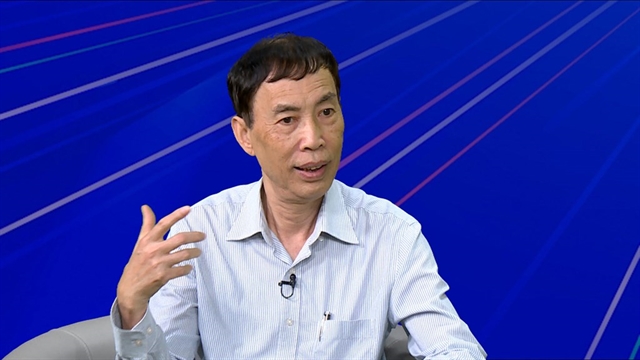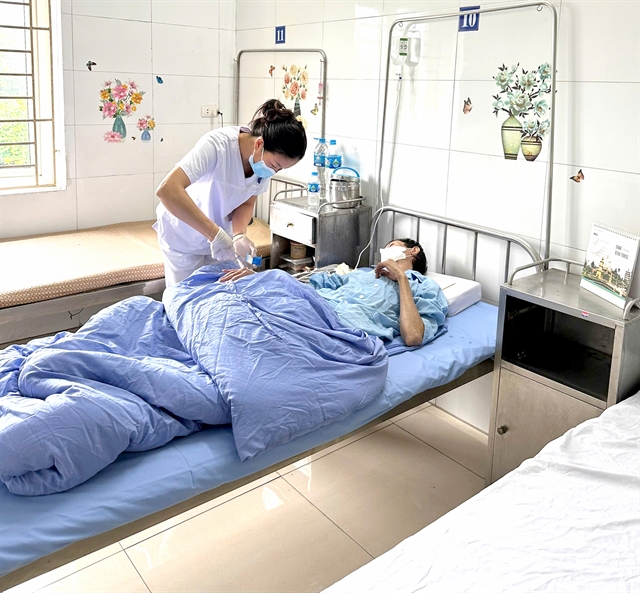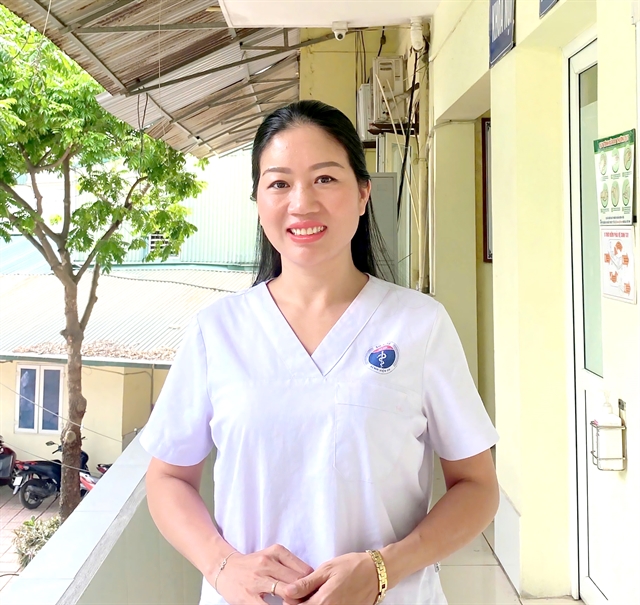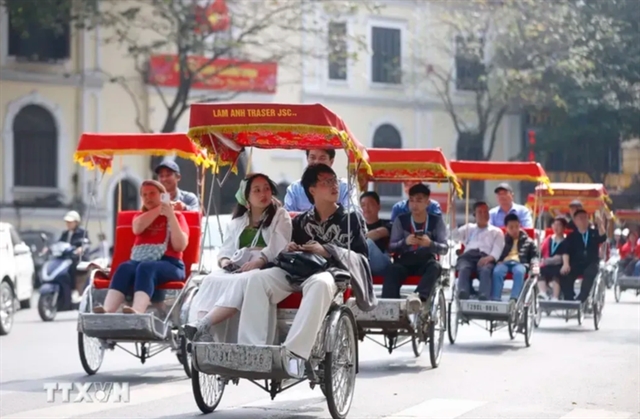 Society
Society

 |
| Nurse Lý Thị Thu takes care a patient at the Hà Nội Hospital for the Care and Treatment of HIV/AIDS Patients. — Photo suckhoedoisong.vn |
Nguyễn Châu
HÀ NỘI — At 8am the air in Hà Nội is cool, the drizzle faint and lingering, and nurse Lý Thị Thu is already deep in her routine at Hospital 09 – the Hà Nội Hospital for the Care and Treatment of HIV/AIDS Patients, where she has worked for almost two decades.
When she greets visitors her smile is gentle and her voice hoarse from the previous night’s shift. She says softly “I was on duty last night - had a patient in critical condition who needed emergency care.”
In the place, she explains, there are few moments of joy and even fewer of laughter. Her eyes, ringed with dark circles, reveal a night without sleep. The faint smell of disinfectant still clings to her hands.
“Everyone here feels the same, compassion mixed with fear. No one dares to say they’re not afraid. We face the risk of infection every single day. But if fear takes over, no one would last long.”
Working in such an environment requires a will of steel, Thu tells Sức khỏe & đời sống (Health & Life) online newspaper.
“The more you worry, the more careful you must be.”
Every single task demands attention, every needle, every bandage. Some colleagues have caught tuberculosis from patients, others have faced accidental exposure.
“It makes you vigilant. But once you choose the path, you learn to accept the risk and live with it,” she said.
Thu still remembers her first shifts as a young nurse, when senior colleagues guided her with both skill and strength. But their words only truly made sense the night she worked alone, facing a patient’s final moments.
“One night a patient passed away quietly,” she recalls.
“I was filling out the paperwork and crying at the same time. It’s heartbreaking because at the very end, it’s only us, the nurses, by their side.”
Here, caring for patients with HIV/AIDS means living constantly on the edge. Many also suffer from psychiatric disorders or behavioural disturbances, making treatment far more complicated.
“There have been times when patients attacked doctors or nurses,” Thu says. “Once, during a blood draw, a patient jerked suddenly, sending blood splattering everywhere.”
One incident remains vivid in her mind, involving a patient with severe mental illness who was full of anger towards his family. When his demands were refused, he slashed his own body with a razor blade.
“He was screaming, running down the corridor, blood covering the floor and walls. Even security couldn’t stop him. The head of department had to come in. Only when he calmed down could we clean and dress his wounds,” Thu said.
Every drop of blood carries risk. Yet amid the chaos, medical staff must stay composed to keep themselves safe and to save lives.
“That night, I scrubbed every streak of blood from the floor, washed every towel in a bucket of red water,” she said.
“People call us brave, but in truth, there’s no time to think about fear. You just do what you must.”
And still, after countless sleepless nights, Thu has never walked away. “If we don’t do this,” she said, “who will help them?”
 |
| Nurse Lý Thị Thu at the hospital. — Photo suckhoedoisong.vn |
Friend to the forgotten
At Hospital 09, Thu’s work extends far beyond medicine.
“Most patients who come here have nothing, no family, no possessions,” she said. "The State covers their treatment but what they really need is affection. Sadly, most have no one left to care for them.
"Many arrive in despair, abandoned by family, with nowhere to go, often in the final stages of illness.
“All we can do is make them as comfortable as possible, ease their pain, and help them feel a little less alone.”
When Thu first joined, the hospital was still a small, bare facility with peeling walls, outdated equipment, not enough staff but overflowing wards.
“I’ll never forget one young man,” she added, her voice faltering. “He was about my age, maybe twenty-something. Handsome, gentle… He was dying of AIDS. No one came with him.”
She used to chat with him during quiet moments.
“He said he just wanted to go home, to see his mother again, but it was too late.”
“That night, he passed away, sitting quietly on his bed. Earlier, he’d been smiling, talking as usual. When I realised, I couldn’t stop crying.”
It was the first time she cried for a patient, not out of fear but compassion.
“He was my age. And he died alone, without a hand to hold.”
The road she chose
Since 2008, Thu has travelled 60km each day from Sơn Tây Township to the hospital and back.
She leaves home at 5am, returns around 8pm or 9pm. Sometimes the bus breaks down or the road floods and she has to walk a long stretch. By the time she gets home, her children are asleep.
“I’ve cried a few times out of exhaustion but I chose this job, so I’ll see it through,” she said.
Those early bus rides and late-night journeys have become the rhythm of her life.
“Sometimes I don’t even have breakfast, just a glass of water before rushing to the ward. But thinking of the patients waiting gives me strength,” she said.
Her parents were once adamantly opposed to her working at an HIV hospital.
“They were terrified. They told me to find an easier, safer job. But I didn’t listen. I just went quietly every day, studied more, and kept working. Eventually, they accepted it,” she said.
Her husband, a soldier, is often away. For years, Thu had to manage both work and childcare.
“Every day I woke up at 4.30am, cooked porridge for the kids, took them to my parents, then went to work. At night, I returned home and cleaned till midnight. I honestly don’t know how I got through those years,” she laughs softly.
Unnamed reward
The salary is modest with no extra income.
Yet for Thu, the reward lies elsewhere.
“When I see a patient regain strength, take a few steps, or simply smile, all the fatigue disappears. Some arrive hopeless, but after months of care, they learn to look after themselves, and say thank you to the medical staff. That’s enough.”
To Thu, nursing is not just a job, it is a way of life.
Her days begin with the first bus and end under the late-night glow of her kitchen light.
In those quiet hours, she has found meaning in her calling, a profession that seems to have chosen her too.
Today, with consistent antiretroviral (ARV) therapy, viral loads can be controlled, allowing many people living with HIV to lead healthy lives, marry and have HIV-free children.
Thu’s voice brightens as she speaks of them.
“I’ve cared for many couples who are both HIV-positive. Now they have children who test negative. Every time they visit for a check-up, carrying their healthy babies, I feel happy,” she said.
She recalls one couple, once rejected by their families, living in a damp rented room. With medical care and counselling, they recovered and decided to have a child.
“Their child is nearly ten now, strong and full of life. When I see them, I know these twenty years haven’t been wasted,” Thu said.
Another patient, Nguyễn Như M. from Phú Thọ, recently arrived severely malnourished and unable to walk or eat.
After days of treatment, he improved remarkably.
“My son can walk again, eat again,” his mother said joyfully.
For Thu, that is the greatest reward, the unnamed one.
No medals, no certificates, just gratitude in a patient’s eyes, a child’s laughter are the greatest reward for Thu.
For nearly twenty years, Thu has tended to the forgotten with steady hands and a boundless heart.
Her happiness, she says, is simple.
“Just seeing a patient live one more peaceful day, that’s enough for me,” she said. — VNS




